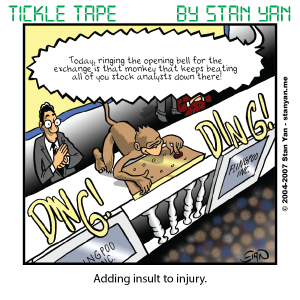Many traders underestimate the influence of stress. Stress is not only a psychological reaction but a biological response as well. When you are stressed, your body reacts instinctively. You are agitated, on edge, and ready to lash out. Your attention is restricted. Your mind is closed and inflexible. The stress response has a specific biological, adaptive function: Your energy is channelled into making the simple response of fighting an opponent or running away. Not only is your energy channelled, but your perceptions are limited. Trading requires a more complicated skill set, though, and when you feel stressed out, you are bound to make a trading error.
It’s surprising how stress can impact your ability to trade effectively. What’s there to impact? Trading isn’t that complicated, is it? Actually, there’s a great deal that can happen. You can have a very complete trading plan, where every aspect is spelt out clearly, and you may have a wealth of experience executing such plans, but when you are stressed out, even the most simple task can be difficult to complete. You may not see an obvious signal to take action. And even when you see the signal, you can make a small mistake when you’re stressed.
Again, you are agitated and your psychological perceptions and intuition are restricted and closed off. You miss little things and have a tendency to respond quickly without thinking. While trading, we often do things automatically, without thinking, but stress can cause us to act so quickly that we miss something. We may forget to place an order according to plan or we may misread a signal and close out a position too early. These little errors can be frustrating.
How can you beat stress? The most effective stress control strategies prevent stress before it happens. It is useful to minimize potential stressors. Getting into an argument with your spouse, for example, can put you in a bad mood that can escalate into an intense, distracting mood later in the day. Minor hassles can build up. For example, you may get cut off on the way to work, or the police may wrongly give you a traffic ticket.
It can all add up and set the stage for an incapacitating stress response. It’s vital to acknowledge the power of these stressors, and when you feel agitated by them, you may want to stand aside until you feel better. Your trading environment can also impact your ability to handle stress. In many ways, trading is an art. You wouldn’t try to create art in a noisy, chaotic environment, and you may not want to trade in such an environment either.
Sure, the pit at the CME is full of action, but depending on your temperament, you may not want to bring this kind of confusion into your trading environment. A quieter environment is more conducive to staying calm and trading with a focused mindset. You can’t remove all possible stressors, but when you start feeling agitated, you can try to take active steps to alleviate the uneasiness. You feel stress when you feel personally threatened.
When stressed, you feel that your security is compromised. When you feel a little shaken, it’s vital to return to a calm, focused mindset. One of the most effective thinking strategies is to remove yourself from the situation; create a sense of psychological distance. Don’t make a stressful event personal. Pretend you are an observer looking at your life as dispassionately as possible. Think unemotionally and strategically. Pretend nothing really matters and that you are merely trying to actively problem-solve to get ahead.
Trading requires an optimal mindset. When you are upset, tired, and emotionally distracted, you will have trouble following your trading plan. It’s vital to return to a calm, focused mindset, a mindset where you are attentive and alert and can trade like a winner.


